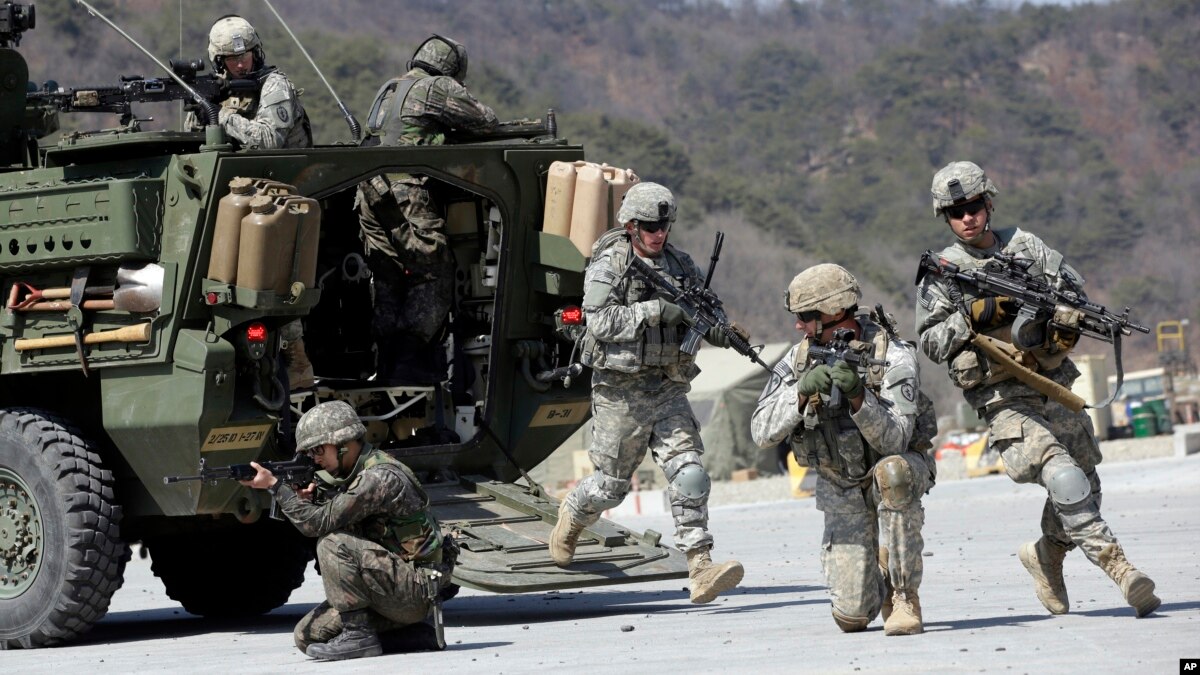
The United States should consider curtailing the U.S.-South Korea joint military exercises held annually on the condition that North Korea agrees to give up its nuclear weapons and intercontinental ballistic missiles (ICBMs) that Pyongyang claims can reach the U.S. mainland, a U.S. lawmaker said.
In a letter signed by a bipartisan group of 32 members of the House of Representatives, Rep. Ro Khanna, a California Democrat who represents Silicon Valley, also suggested that President Donald Trump consider re-establishing a “military-to-military” hotline with North Korea.
“There are members of Congress who have signed onto my letter who are open to [the reduction in joint military exercises], but only under the condition that North Korea really commit to denuclearization and to not developing intercontinental ballistic missiles that can hit the United States. If they do that and in exchange we are reducing the size of joint exercises … I think that’s a reasonable solution,” Khanna said of the letter delivered to the White House.
The U.S. and South Korea usually hold two major joint drills each year.
Danger to US security
Khanna, a member of the House Armed Services Committee, told VOA’s Korean Service Monday that many of the co-signatories to the letter, which was delivered last week, believe Trump’s hawkish foreign policy strategy and escalating war-of-words with North Korean leader Kim Jong Un could endanger U.S. security.
Khanna on January 18 reintroduced HR 4837, the “No Unconstitutional Strike Against North Korea Act.”
“It’s shocking to me that we have military-to-military communication with every other power in the world, but we don’t with North Korea. This is necessary to prevent a miscalculation, to prevent a mistake. We should definitely establish that kind of communication,” Khanna said.
At the same time, Khanna said the U.S. needs to provide a security guarantee to the Kim regime: “We first need to assure North Koreans that we have no interest in its regime change. Second, we need to look at how we can restrict their nuclear ability to attack the U.S. homeland.”
In an op-ed published in the San Francisco Chronicle, Khanna wrote: “Military-to-military relations are important with a paranoid North Korea, considering that we conduct war games and that our bombers conduct flybys along its border.”
“North Korea’s leadership constantly fears a U.S. attack, making it … crucial that we notify its military when our actions do not pose a threat. The recent agreement between North Korea and South Korea to re-establish their military hotline provides a model. The United States should pursue a similar agreement," he wrote.
Khanna told VOA the U.S. should be open to talking with the reclusive regime to initiate the process of engaging North Korea to halt the development of its nuclear weapons and ICBMs.
Leading North Korea into a dialogue, persuading the regime to give up its weapons, and eventually engaging it, are the first steps on the path toward normalization, Khanna said.
Agreed Framework review
Khanna added this might require the U.S. to review the Agreed Framework signed by Washington and Pyongyang in 1994 under the Clinton administration. The agreement called for North Korea to freeze its plutonium production in return for economic aid.
Khanna spoke with VOA at a time when the tension between the two Koreas is thawing, despite continued iciness between Washington and Pyongyang.
Seoul and Pyongyang held their first high-level talks in two years starting on January 9, in Panmunjom on the North Korean side of the Demilitarized Zone (DMZ) between the two countries. The talks came several days after South Korea and the U.S. announced that they will postpone joint military training exercises on the Korean Peninsula for the duration of the 2018 Pyeongchang Winter Olympics to be held from February 9-25.
Just days after the DMZ talks, Hawaiian officials sent an emergency alert warning of an incoming ballistic threat that triggered widespread panic throughout the U.S. state before it was determined to be a false alarm due to human error.
The incident underscored the heightened tensions between the U.S. and North Korea.
Christy Lee contributed to this report, which originated in VOA’s Korean Service.
Read More US Lawmaker: Curtail US-South Korea Drills in Exchange for North's Denuclearization : http://ift.tt/2rFYNov
No comments:
Post a Comment